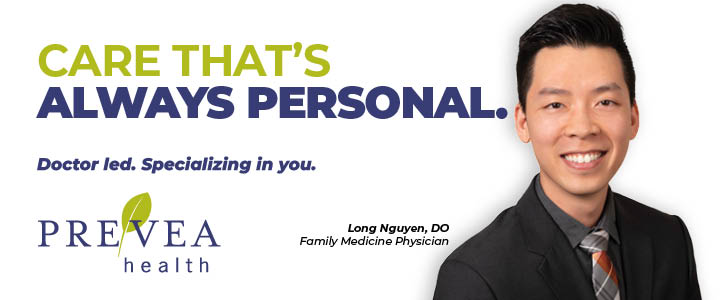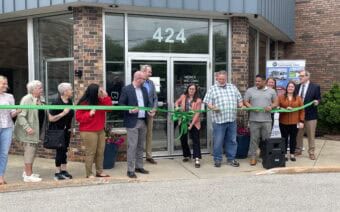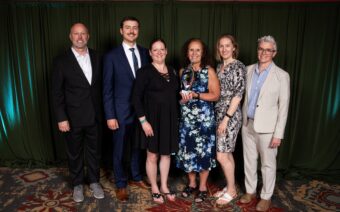
November 18, 2024
GREEN BAY – Eighty-year-old Peter Fergus has been a practicing cardiologist for nearly 50 years, and as he wrote in his new book – “A Life Worth Living: A Cardiologist’s Historical Memoir” – “I have no plans on retiring until I am dragged out of here on a stretcher.”
“I’ve known many of my patients for 30, in some cases, 45 years,” he said. “They’ve never been taken care of by another cardiologist, and we’ve been through the thick and thin.”
Fergus said when he arrived in Green Bay to practice cardiology at the Bellin Memorial Hospital in 1975, he noticed a disconnect between his mission as a healthcare provider and that of his partners.
“There were only two cardiologists in the whole City of Green Bay at that time,” he said. “(One) was kind of bragging to me how busy the practice was, which is okay, but then what bothered me is he told me how many heart operations (he’d done).”
Back then, Fergus said there was only one way to treat coronary artery disease if you had a heart attack or blockage, and that was through bypass surgery.
At the time, Fergus said he wasn’t happy “that the focus seemed to be on doing bypass surgery on so many patients, but I accepted it, and I said to myself, ‘I’m going to change this.’”
After nine years of working alongside those cardiologists at Bellin, Fergus said, “I decided to resign from that practice, and I started my own practice, which I called Green Bay HeartCare.”
Context is key
Fergus said part of the reason he wanted to write the book is “I want (my patients) to know more about me and how I got to be the person that I am.”
Fergus said his story began with his father’s escape from the rise of anti-semitism in his home country of Hungary in the early 1930s – landing in New York City in 1935 and changing his name from André Forgacs to Andrew Fergus in order to disguise his Jewish heritage (a secret Fergus said his father kept from him until his teenage years).
Prior to arriving in America, Fergus said his father and his father’s brother, Paul – supported by their mother Bertha – traveled across Western Europe while studying their chosen medicinal disciplines – Fergus’s father chose psychiatry.
After securing a job in a state hospital in Binghamton, New York, Fergus said his father met his mother Rita – who was studying to be a physiatric nurse at the same hospital.
“My father was very cautious not to try to push me into psychiatry or even into medicine,” he said. “But being smart when it comes to emotions, he would every now and then say, ‘What a great profession the practice of medicine is, because you can practice medicine in so many ways…’ (letting) me know that it was a great occupation.”
Fergus writes in his book about how his parents (as psychiatric professionals) nurtured his emotional intelligence, which in turn served him in his mission of promoting preventative versus reactionary care – part of which includes empathizing with, and educating the patient.

“I think the system kind of works against giving doctors the time to do that kind of teaching because of the interference of insurance companies with the compensation for what doctors do,” he said. “So to make up for the decrease in compensation, doctors have a tendency to see more patients, which means less time per patient.”
Fergus said in order for a patient to fully benefit from the care they receive, they need to know why doctors are suggesting certain treatments – writing in his book that patients want to be “cared for and not just treated.”
“If (a patient) understands what the medicine or my advice is all about, they are more likely to follow that advice,” he said. “You can’t just hand a patient a pill and say, ‘Take this and things will get better.’ They have to know what the pill is going to do for them that will make them feel better.”
This interference in combination with his goal of practicing preventative care, Fergus said, led him to start Green Bay HeartCare.
“I was able to hire nurses and technologists and secretaries who all believed in the same model that I was promoting,” he said. “Which is kindness, compassion, empathy, understanding of the stresses patients were going through.”
Why cardiology?
Fergus said though his father encouraged him to join the medical field, a doctor he worked with while interning at Boston City Hospital got him into cardiology.
“One of my professors was extremely charismatic, knowledgeable, friendly and smart,” he said. “When he would step on the floor in the ward with all the interns and residents, he just took over the whole room, and everybody was just focused on him and what he had to say. I said to myself, ‘I want to be like him,’ and his practice was cardiology.”
Fergus said that doctor, among many others, taught him numerous important lessons throughout his education, citing a time one of his mentors said, “Let the patient talk and he will give you the diagnosis.”
He said he still carries that lesson with him in his current practice.
“I allow patients to tell me about their lives because stress is such an important part of heart disease,” Fergus said. “So as a result of that, I’m almost part of their family.”
When designing his Green Bay HeartCare office, Fergus said he made it a point to make it a relaxing environment.
“I designed my waiting room to look like a living room – I didn’t want it to look like a doctor’s office, and I didn’t want it to look stressful,” he said. “If you’re worried, the worry drives your blood pressure up, drives your heart rate up and produces hormones that make your heart work harder. I wanted to eliminate all that. I couldn’t do that in the original group that I was part of because they didn’t have the same focus on prevention and stress reduction that I did.”
Waiting for the world to change
At the time Fergus began practicing cardiology, he said he had to wait for technology and medicine to catch-up to the kind of care he was trying to provide.
“When I started in 1975, there was no way to control cholesterol,” he said. “In fact, there were some cardiologists who didn’t think cholesterol mattered at all.”
Fergus said that changed when doctors discovered the two types of cholesterol – high-density lipoprotein (HDL), the good kind – and low-density lipoprotein (LDL), the bad kind.
“A high LDL predicts a high risk for coronary artery blockages and diffuser for that person, and medicines to lower the LDL were not developed until 1985,” he said – writing in his book that, “I simply needed to be patient while technology developed the tools that I would require to achieve my goal of prevention and early treatment.”
Fergus said he and his wife, Kathy, chose to come to Green Bay because of the lack of cardiologists and the opportunities that the city provided to get on the ground floor of revolutionary care.
“We said to ourselves, ‘We are young – let’s give it a try. It sounds like a great opportunity,’” he said. “I just wanted to go out and make sick patients feel better. So this practice really appealed to me because it gave me the opportunity to do just that.”
Fergus writes in his book “there were only two local cardiology programs from 1984 through the early 2000s: Bellin’s Cardiology Associates and my Green Bay HeartCare.”
Even though cardiology programs in the city have since expanded, Fergus said the legacy of his family and Green Bay HeartCare will live on with the Andrew Fergus Memorial Scholarship fund, writing in his book that as of this year “(the) scholarship fund has been helping (nursing) students for 15 years and counting.”
As the medical field and insurance’s involvement in patient care evolved, Fergus said in 2008 it was in his and his patient’s best interest that Green Bay HeartCare be absorbed into Prevea Health Care – where he is now practicing.
Fergus said it took him two years to write his book between patients and in his spare time.
“I would have my writing notebook with me in the office, and once in a while a patient wouldn’t keep his appointment,” he said. “So I would have 45 minutes to an hour to sit down and write my book and do some research, too.”
Fergus said he hopes those who read his book take away its central message of context and prioritizing preventative care – writing that, “No one can escape their past. The stresses and emotions of past experiences play a role in how we react in our present.”
“A Life Worth Living: A Cardiologist’s Historical Memoir” is available on amazon.com.
 GRB’s United Airlines team honored with safety award
GRB’s United Airlines team honored with safety award Wittenberg-based community staple under new ownership
Wittenberg-based community staple under new ownership








